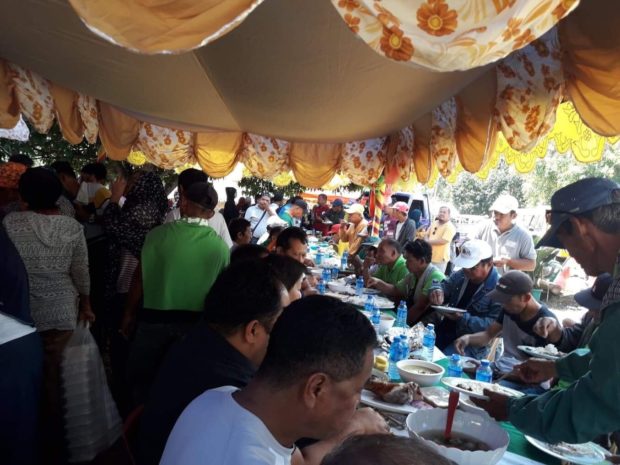Ramadan call: Uphold sanctity of ballot

COMMUNAL MEAL Muslims eat “kanduli” fish during a traditional communal affair on the eve of Ramadan in Carmen town,North Cotabato province. —TAHER SOLAIMAN
ZAMBOANGA CITY, Zamboanga del Sur, Philippines — Muslims worldwide begin on Monday the monthlong observance of the holy month of Ramadan, with those in the Philippines enjoined to uphold and protect the sanctity of the ballot.
Ramadan had been expected to begin on Sunday but Bangsamoro Grand Mufti Abu Huraira Udasan said the crescent moon, the signal for the start of the fasting month, was not seen on Saturday night.
Drieza Lininding, chair of the Moro Consensus Group, hoped that the “sacredness of one’s ballot” would prevail, as the May 13 midterm elections would take place during Ramadan.
During the season, Muslims are required to abstain from food, drink and sex.
“Our call to our candidates is to reflect during this holy month and to pray for guidance from above. Think of what is good for the whole of their constituents and not for themselves and family only,” Lininding said.
Article continues after this advertisementEvery election, vote-buying is rampant and in this season, according to Lininding, the call to fasting gives every Muslim voter the chance to reflect deeper on the sanctity of the vote.
Article continues after this advertisement“The voters should not sell their votes and their future. Election comes every three years so we need to elect leaders that will fight and stand for us, not leaders who serve people in Malacañang,” Lininding said in an interview.
He said Lanao del Sur and Marawi City badly needed leaders who would stand up and fight for them no matter the consequence.
Fate of Moro people
Amirah Lidasan, secretary general of the Moro-Christian Peoples Alliance, saw Ramadan as vital in defining the fate of the Moro people as they would hopefully choose leaders who could speak for and side with the marginalized Muslims.
“This Ramadan is very important to our people and we look forward to a very peaceful and honest election. The sad part here, many of the Muslim communities are categorized as hot spots, besides being under martial law. These conditions place our people in a more vulnerable condition,” Lidasan said.
In Western Mindanao, more than 2 million Muslims are praying for a corrupt-free government and leaders, says Alih Aiyub, the deputy secretary general of the Regional Council of Ulama in Region 9.
Aiyub called on the Islam faithful not to sell their votes.
“Do not sell your votes, its haram. Vote for the future of your children to have a peaceful and prosperous region,” he said in an interview.
He appealed to candidates to be “servant leaders with integrity, competence and dedication to serve your people to eradicate poverty and ignorance.”
He also reminded candidates to play fair and follow Allah’s teachings. “Be honest and respect the sovereign will of the people. Do not cheat, buy votes, and coerce and the like.”
Renewal of faith
Aiyub said fasting was not about looking great and kind to others’ eyes but a renewal of faith to Allah and to oneself.
Millions of Muslim Filipinos in Mindanao are living far below the state of what is being desired, said Lininding.
In Marawi City alone, there are still 127,309 internally displaced people, Lininding said, quoting figures from the United Nations High Commissioner for Refugees.
Since last year’s Ramadan, people, especially those who are living in tent cities, have been trying to cope, despite martial law and curfew, he said.
“But Ramadan is not all about joy and happiness; its also a time to reflect and experience the sacrifice and hardship. That is why we fast,” Lininding said.
It would, however, be “extremely difficult to fast if you are displaced from your own home, from your own community.”
Lidasan said that during Ramadan, “we feel closer to Ummah, where a community, rich or poor fast together and we pray together.”
In Zamboanga City, Aiyub said they were also praying for the families that have been displaced by the 2013 clashes between followers of Nur Misuari, founding chair of the Moro National Liberation Front, and government forces.
More than 200 families are still homeless and scattered in 11 transitory sites in the city. —With a report from Taher Solaiman